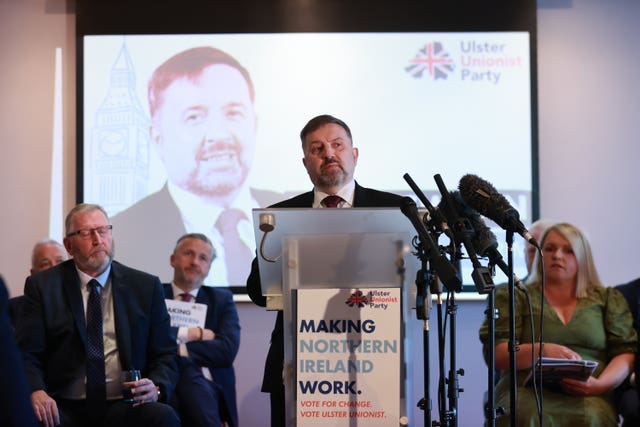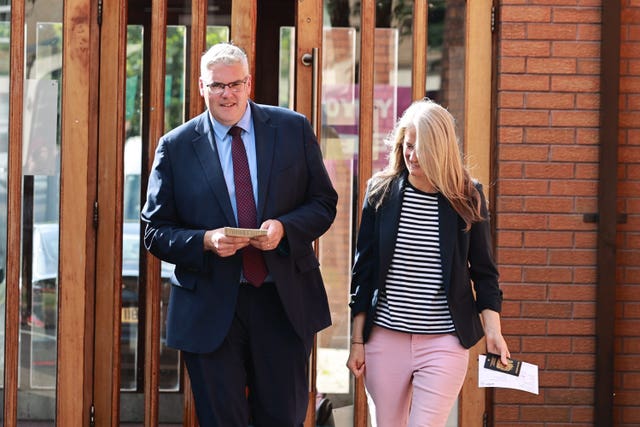Several counts in Northern Ireland look to be on a knife edge
The DUP is under pressure in several areas, while Sinn Fein is increasing hopeful of holding the ever tight Fermanagh and South Tyrone.

Counting is continuing in Northern Ireland, with several constituency battles appearing to be on a knife edge.
The high-profile contest between DUP leader Gavin Robinson and Alliance Party leader Naomi Long in East Belfast is among those seats that remain too close to call.
In other key constituency battles, the DUP candidate Jonathan Buckley has conceded defeat in Lagan Valley to Alliance’s Sorcha Eastwood.
Ms Eastwood expressed her delight ahead of the result being formally announced, describing it as a “huge achievement” for her party and the whole community across Northern Ireland.
Lagan Valley is the seat long held by former DUP leader Sir Jeffrey Donaldson, who stepped down as leader in March when he was charged with historical sexual offences – charges he denies.
While that was a gain for Alliance, the party is set to lose a seat in North Down, where the cross community party’s deputy leader Stephen Farry has all but conceded to independent unionist Alex Easton.
One race that few predicted would be tight was North Antrim but the DUP’s Ian Paisley is locked in a major battle to retain his seat and hold off the challenge of TUV leader Jim Allister.
The UUP is increasingly hopeful former Stormont health minister Robin Swann can take a seat from the DUP in South Antrim.

Asked if Sinn Fein was nervous about the result in the constituency, Sinn Fein vice president Michelle O’Neill said: “We’re feeling very confident that it has been a good poll from us across the board but it’s very early in the evening.”
Ms O’Neill added: “The politics of this election was very much about the politics here at home, about making the Executive and the Assembly work.”
All eyes are on the race for the greatest number of seats across Northern Ireland, with the potential of Sinn Fein cementing its position as the largest party in the region, having come out on top in the last Assembly and local council polls.
Such a result for the pro-Irish unity party would be bound to intensify the debate around the region’s constitutional future.
Sinn Fein, which ran a relatively low-key campaign, could secure first place by retaining the seven seats it already holds, if the DUP drops down from the eight seats it won in 2019.
The DUP is under significant pressure in a number of constituencies and could be in for a bruising night.
Mr Robinson’s elevation to the leadership of his party came after the DUP suffered a seismic shock when former leader Donaldson quit.
Apart from the sudden departure of Donaldson from the political stage, the DUP has also been under fire from unionist rivals amid claims it oversold a Government package of measures on post-Brexit trading arrangements that the party used to justify the end of its two-year boycott on devolution at Stormont in January.

The Ulster Unionists were without an MP in the last parliament and the party was growing in optimism on Friday morning that it will pick up South Antrim.
Asked if he was on course for victory in South Antrim, Mr Swann said: “It seems to be heading that way.”
However, retired Army colonel Tim Collins, who ran for the UUP in North Down, blamed voters being more interested in “potholes and hedges” than international affairs after conceding defeat before the result was declared.
Success for the SDLP would be the retention of the two seats held in the last parliament by its leader, Colm Eastwood in Foyle, and deputy leader, Claire Hanna in South Belfast and Mid Down.
Ms Hanna said both are set for victory.
The TUV, which is an arch critic of the DUP’s decision to drop its protest boycott on devolution, did not stand in the last election.
The party suffered a blow last month when Reform UK leader Nigel Farage personally endorsed two DUP election candidates, despite his party having an official electoral alliance with the TUV in Northern Ireland.
That led to a highly unusual situation in TUV leader Mr Allister’s own North Antrim constituency, where he ran on a joint TUV-Reform UK platform, even though Mr Farage personally backed the DUP candidate in that area, Mr Paisley.
However, that does not appear to have derailed Mr Allister’s challenge and he has performed well above the expectations of many.





